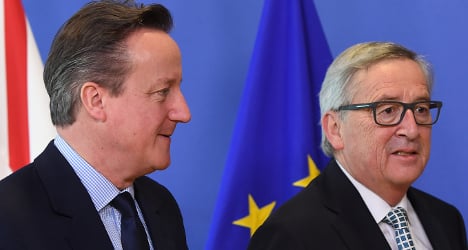For the past two years the Swiss federal government has been in discussions over how to apply the result of the February 9th 2014 referendum which approved the principle of limiting immigration to Switzerland.
The government – which opposed the initiative – must decide what form these limits should take before the measure is due to come into force in February next year.
The referendum result conflicted with existing bilateral agreements with the EU, which is founded on the core principle of free movement for its citizens.
In December the Swiss government presented a Plan B “safeguard” strategy which would apply the brakes to immigration unilaterally should negotiations over a bilateral agreement with the EU fail.
But European Commission President Jean-Claude Juncker rejected the proposal.
Now Brussels has “frozen” negotiations with Switzerland over the matter until the outcome of so-called Brexit is known, reports Le Temps, quoting a source high up in Europe.
Britain will go to the polls on June 23rd to decide whether it should leave the EU.
Le Temps' source told the paper that Switzerland would be wise to keep quiet on immigration for the time being.
“The smallest reference to quantitative restrictions or a quota system will be seen as a provocation,” the source said.
The warning comes days after Europe agreed a renegotiation of Britain’s EU membership.
But Switzerland cannot assume that concessions granted to Britain over immigration in the context of Brexit would then be granted to Switzerland too, said the source.
The source points out that British Prime Minister David Cameron had to settle for limits on child benefits for immigrants rather than restrictions on immigration itself.
Brussels will also be eyeing the result of this Sunday’s popular vote in Switzerland on the expulsion of foreign criminals.
“If that initiative passes, that would be a further blow to the principle of free movement,” the source told Le Temps.
Nevertheless, discussions on the matter will continue after the Brexit decision, said the source.
“We have every political, economic and emotional reason to find a solution. Our doors will be open again the day after the British referendum.”




 Please whitelist us to continue reading.
Please whitelist us to continue reading.
Member comments